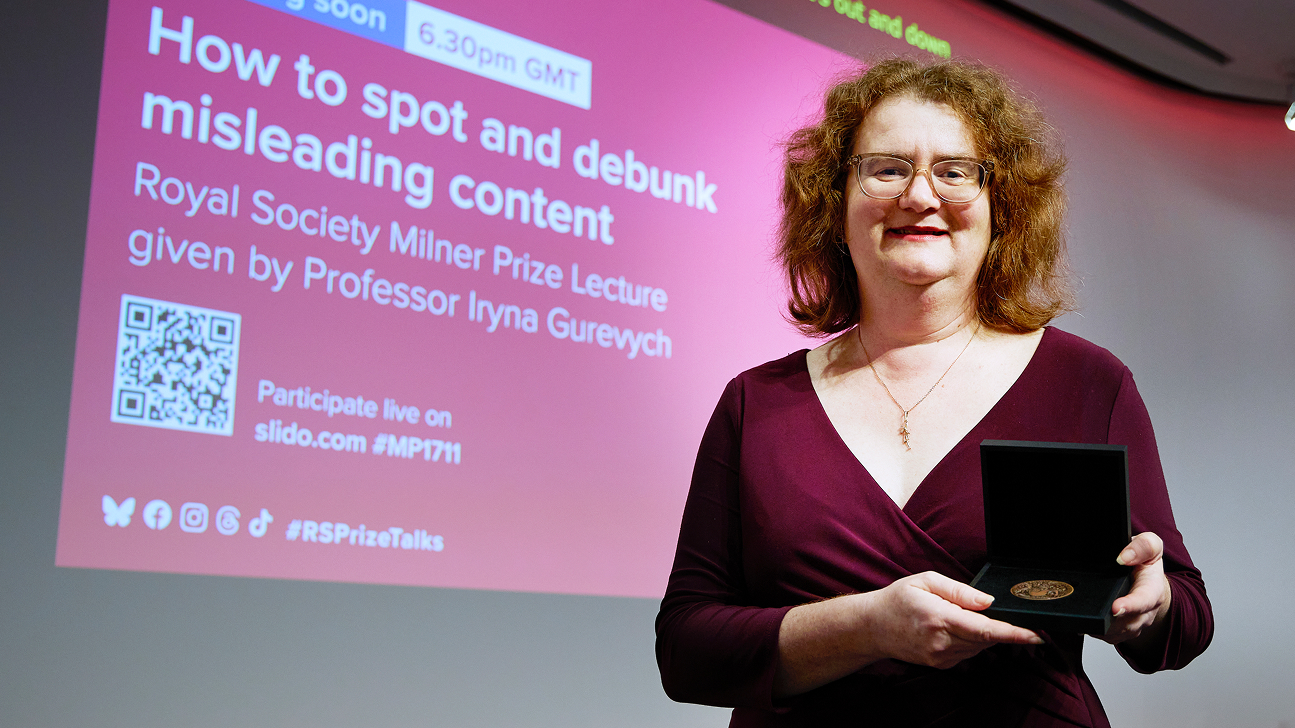MBZUAI’s Iryna Gurevych wins 2025 Royal Society Milner Award
Friday, November 21, 2025

Iryna Gurevych, Adjunct Professor of Natural Language Processing at MBZUAI, has been named the 2025 recipient of the Royal Society’s Milner Award and Lecture, one of Europe’s premier honors in computer science.
The Milner Award, launched by the UK’s Royal Society in 2012 and supported by Microsoft Research, is named after computing pioneer Robin Milner. It recognizes one outstanding European computer scientist per year who has made substantial contributions in their field and shows strong potential for further top-level achievements. The prize is conferred by the Royal Society’s Council, on the recommendation of the Milner Award Committee, and includes a bronze medal and a £5,000 (US$6,500) honorarium.
Gurevych received the award for her contributions to natural language processing (NLP) and artificial intelligence (AI), which combine a deep understanding of human language and cognitive faculty with the latest paradigms in machine learning.
“This is the first time that the Milner Prize has been awarded to a researcher from NLP. I am very proud of this success for my whole scientific community, and I am very glad I could contribute to this success,” said Gurevych.
“Processing big data and multimodal corpora with NLP tools and AI is now mainstream. Using search engines and LLMs to work with information will be a core part of AI literacy. I’m excited that my research has fundamentally helped to make such a positive, real-world contribution.”
In addition to her role at MBZUAI, Gurevych is a professor at TU Darmstadt; an adjunct professor at INSAIT (Bulgaria); the inaugural LOEWE Chair of Excellence and Distinguished Professor at Germany’s National Center for Cybersecurity ATHENE; and a Fellow of both the Association for Computational Linguistics (ACL) and the European Laboratory for Learning and Intelligent Systems (ELLIS).
Pioneering NLP research
An example of Gurevych’s achievements is her work on computing sentence similarities, published in 2019. “For the first time, we could efficiently compute sentence-based similarities for a huge amount of text based on pretrained language models,” she explained. “This is the foundation of dense retrieval methods, which are the core of Retrieval Augmented Generation used by current LLMs at large scale.”
She is also a pioneer of argument mining: the technology that allows the extraction of natural language arguments (claims, premises, relations) from free text. Her current research spans the intersection of NLP, language-based human-AI collaboration in expert domains, and cybersecurity – studying both how language models work and how to make them safe for the public.
That safety focus underpins the theme of her work on ‘misleading content’ – the most difficult class of misinformation, where facts may be technically true but framed to drive false conclusions.
“We present new approaches to exposing misleading information in text, images and visualizations,” she said. “Though the truth may ultimately not exist in many cases, providing the evidence for the audience and for the LLMs to reason is key to building resilience against misinformation.”
“Build a unique profile”
In her Milner Lecture, delivered as part of the recent award ceremony, Gurevych spoke on the topic, ‘How to Spot and Debunk Misleading Content’. She explained how her team mirrors human fact-checkers: scrutinizing who makes a claim, why, and how evidence is used or misused; reconstructing the hidden fallacious premise behind misrepresented science; and building tools that contextualize images. She also tackled misleading charts, where techniques such as truncated axes, uneven ticks, or 3D effects distort meaning.
As guidance to the next generation of AI researchers, Gurevych said: “Stop chasing your next paper. Nobody will be remembered for a lot of incremental papers.”
“Young researchers must focus on building a unique profile, a good name and long-term reputation. Think how to address big and complex problems and break them down into feasible steps. Think how to make a real, long-lasting contribution you will be remembered for.”
Looking ahead, Gurevych is excited to explore language-based human-AI collaboration in expert domains: “LLMs are amazing, but they will not be used in expert settings unless the expert can co-construct the solution with the AI.”
She is also keen to investigate the role of peer reviews in how science is evaluated: “How can we assess the true knowledge gain of a paper, rather than measure citations counts, which can be easily optimized and manipulated?”
Most of all, however, her aim is to continue making a meaningful impact through her work.
“The reason I wanted to become a professional researcher was to make a positive change to the world,” she said. “This is something that still inspires me. There are endless opportunities for NLP and AI, and how it can improve our lives in areas such as personalized healthcare, educational opportunities, and cybersecurity, among others.”
Related
From Silicon Valley to social impact through science and education
Eduardo Beltrame reflects on his journey from Brazilian public education to Silicon Valley and MBZUAI, and why.....
- social impact ,
- entrepreneurship ,
- faculty ,
- computational biology ,
- biology ,
- Undergraduate ,
- digital public health ,
Teaching language models about Arab culture through cross-cultural transfer
New research from MBZUAI shows how small, targeted demonstrations can sharpen AI cultural reasoning across the Arab.....
Read MoreAI and the silver screen: how cinema has imagined intelligent machines
Movies have given audiences countless visions of how artificial intelligence might affect our lives. Here are some.....
- cinema ,
- art ,
- fiction ,
- science fiction ,
- artificial intelligence ,
- AI ,


